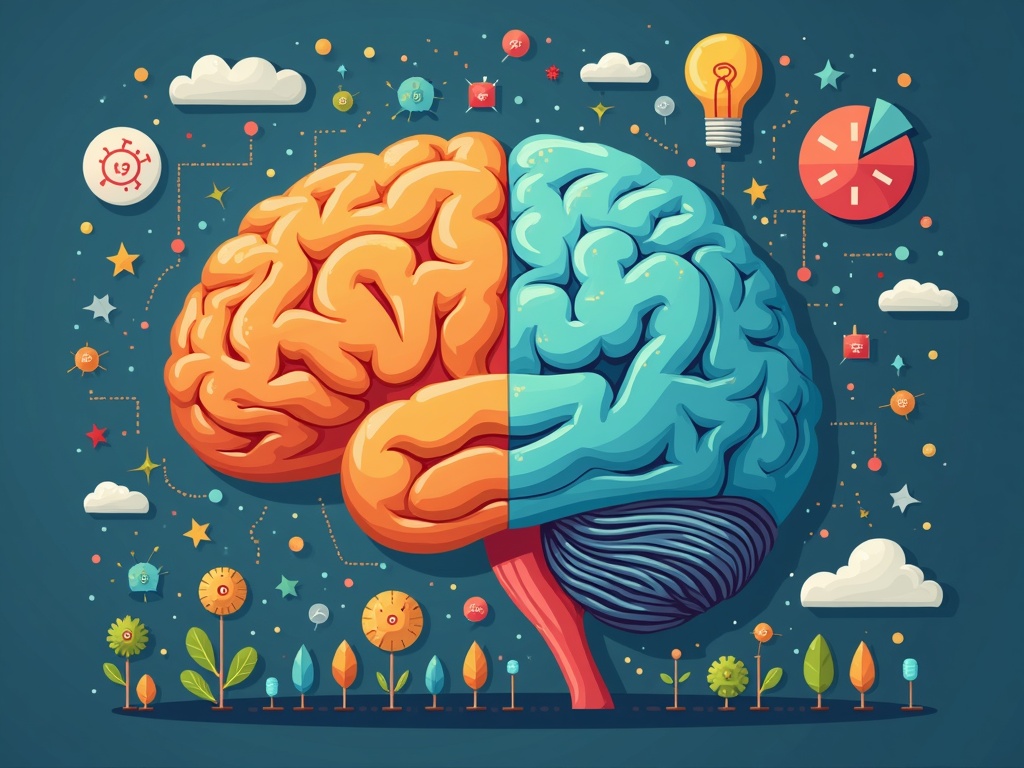Unlock Your Mind: Proven Ways to Improve Memory and Focus with Age
Ever walk into a room and forget why you went there? Or struggle to recall the name of someone you met just last week? As we age, these memory blips can become more frequent, sparking concern and frustration. But here's the good news: cognitive decline isn't inevitable. There are numerous, scientifically-backed strategies you can implement to sharpen your mind, boost your focus, and maintain a vibrant memory well into your golden years. This article explores actionable ways to improve memory and focus with age, empowering you to take control of your cognitive health and live a more fulfilling life.
Understanding Memory and Focus Changes with Age
Before diving into solutions, let's understand the landscape. It’s a myth that aging automatically leads to significant memory loss. While some cognitive changes are normal, like slower processing speed or difficulty multitasking, serious memory impairment is not a given. These natural shifts are often due to factors like:
- Reduced Blood Flow: As we age, blood vessels can narrow, potentially reducing blood flow to the brain.
- Decreased Neuron Size: Neurons may shrink with age, affecting communication efficiency.
- Accumulation of Plaques and Tangles: The buildup of amyloid plaques and tau tangles, hallmarks of Alzheimer's disease, can impair cognitive function.
- Hormonal Changes: Fluctuations in hormone levels can also impact memory and focus.
However, many age-related memory and focus issues aren't solely due to these biological changes. Lifestyle factors often play a significant role. Lack of sleep, poor diet, stress, and inactivity can all contribute to cognitive decline at any age. Therefore, addressing these lifestyle factors can have a profound impact on maintaining a sharp mind.
Lifestyle Adjustments for Enhanced Memory and Focus
Your daily habits are surprisingly powerful tools for cognitive enhancement. Here’s how to fine-tune your lifestyle to support a sharper memory and improved focus:
Prioritize Sleep
Sleep is when your brain consolidates memories and clears out toxins. Aim for 7-9 hours of quality sleep each night. Establish a regular sleep schedule, create a relaxing bedtime routine, and optimize your sleep environment by making it dark, quiet, and cool. Consider cutting down on screen time before bed, as the blue light emitted from devices can interfere with melatonin production, a hormone crucial for sleep.
Nourish Your Brain with a Healthy Diet
What you eat directly impacts your brain function. A diet rich in fruits, vegetables, whole grains, and lean protein provides essential nutrients that support cognitive health. Focus on:
- Omega-3 Fatty Acids: Found in fatty fish like salmon, tuna, and mackerel, as well as flaxseeds and walnuts, omega-3s are crucial for brain cell structure and function.
- Antioxidants: Berries, leafy greens, and colorful vegetables are packed with antioxidants that protect brain cells from damage caused by free radicals.
- Limit Processed Foods, Sugar, and Saturated Fats: These can contribute to inflammation and cognitive decline.
Stay Physically Active
Exercise isn't just good for your body; it's also fantastic for your brain. Physical activity increases blood flow to the brain, stimulates the growth of new neurons, and improves cognitive function. Aim for at least 150 minutes of moderate-intensity aerobic exercise per week, such as brisk walking, swimming, or cycling. Strength training is also beneficial for overall health and cognitive function.
Manage Stress
Chronic stress can wreak havoc on your brain, impairing memory and focus. Find healthy ways to manage stress, such as:
- Mindfulness Meditation: Practicing mindfulness can help you become more aware of your thoughts and feelings, allowing you to respond to stress in a more calm and controlled manner.
- Yoga: Combines physical postures, breathing techniques, and meditation to reduce stress and improve overall well-being.
- Spending Time in Nature: Studies have shown that spending time in nature can lower stress hormones and improve cognitive function.
- Social Connection: Connecting with friends and family can provide emotional support and reduce feelings of isolation, which can contribute to stress.

Mental Exercises to Sharpen Your Cognitive Skills
Just like physical exercise strengthens your body, mental exercises can strengthen your brain. These activities challenge your cognitive abilities and help maintain mental sharpness.
Engage in Brain-Training Games
Numerous brain-training apps and games are designed to improve memory, attention, and problem-solving skills. Look for games that are challenging but not frustrating, and that target specific cognitive skills you want to improve. Examples include Lumosity, Elevate, and CogniFit, but many free options exist as well.
Learn a New Skill
Learning a new skill, whether it's a new language, a musical instrument, or a new hobby, challenges your brain in new ways and helps to create new neural pathways. The key is to choose something that you find engaging and enjoyable, as this will keep you motivated to continue learning.
Read Regularly
Reading is a fantastic way to exercise your brain. It exposes you to new ideas, expands your vocabulary, and improves your comprehension skills. Choose books that challenge you and that you find interesting. Consider joining a book club to discuss what you're reading with others.
Solve Puzzles
Puzzles, such as crossword puzzles, Sudoku, and jigsaw puzzles, are excellent for improving problem-solving skills and spatial reasoning. They also require focus and attention to detail, which can help improve concentration.
Practice Memory Techniques
Mnemonics are memory aids that can help you remember information more easily. Some common mnemonic techniques include:
- Acronyms: Using the first letter of each word to create a memorable word or phrase (e.g., ROY G. BIV for the colors of the rainbow).
- Rhymes: Creating rhymes to remember information.
- Visualization: Creating a mental image to associate with the information you want to remember.
- Chunking: Breaking down information into smaller, more manageable chunks.
Supplements and Medications: What to Consider
While lifestyle changes and mental exercises are the foundation of improving memory and focus, some supplements and medications may also be helpful. However, it's crucial to consult with your doctor before taking any new supplements or medications, as they can interact with other medications you're taking or have potential side effects.
Supplements
Some supplements that have been studied for their potential cognitive benefits include:
- Ginkgo Biloba: An herbal supplement that may improve blood flow to the brain and enhance memory.
- Omega-3 Fatty Acids: As mentioned earlier, omega-3s are crucial for brain health.
- Curcumin: An antioxidant found in turmeric that may have anti-inflammatory and neuroprotective effects.
- Vitamin B12: Essential for nerve function and cognitive health. Deficiency can lead to memory problems.
Medications
In some cases, medications may be prescribed to treat underlying conditions that are affecting memory and focus, such as depression, anxiety, or sleep disorders. Medications may also be used to treat cognitive decline associated with Alzheimer's disease or other forms of dementia. It is important to discuss all medication options with your doctor to determine the best approach for your individual needs.
When to Seek Professional Help
While most age-related memory and focus issues are normal, it's important to be aware of the signs that may indicate a more serious problem. Seek professional help if you experience:
- Significant memory loss that interferes with daily life.
- Difficulty with familiar tasks.
- Confusion about time or place.
- Changes in personality or behavior.
- Difficulty with language.
A healthcare professional can evaluate your cognitive function and determine if there is an underlying medical condition that needs to be addressed. Early diagnosis and treatment can help to slow the progression of cognitive decline and improve your quality of life. Remember, you’re never too old to start prioritizing your brain health.
Embrace Lifelong Learning and Cognitive Engagement
Ultimately, improving memory and focus with age is an ongoing process that requires a commitment to lifelong learning and cognitive engagement. By adopting healthy lifestyle habits, engaging in mental exercises, and seeking professional help when needed, you can maintain a sharp mind, boost your focus, and enjoy a fulfilling and vibrant life for years to come. The power to enhance your cognitive health is in your hands – embrace it!

